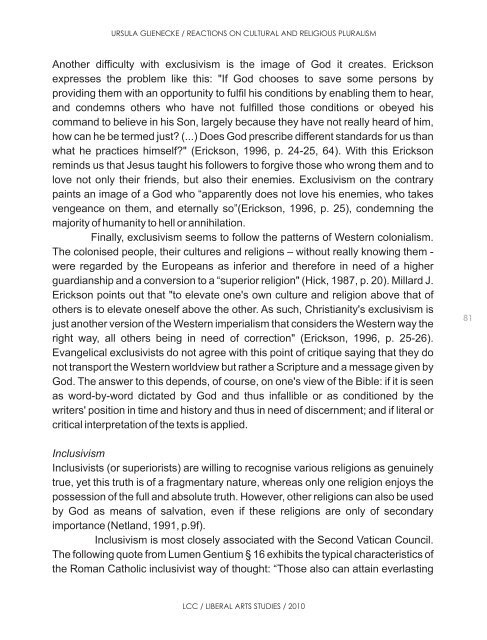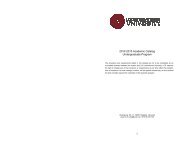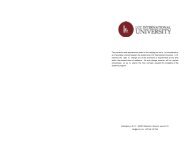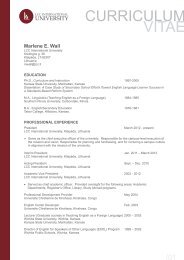lcc liberal arts studies / 2010 volume iii - LCC International University
lcc liberal arts studies / 2010 volume iii - LCC International University
lcc liberal arts studies / 2010 volume iii - LCC International University
You also want an ePaper? Increase the reach of your titles
YUMPU automatically turns print PDFs into web optimized ePapers that Google loves.
URSULA GLIENECKE / REACTIONS ON CULTURAL AND RELIGIOUS PLURALISM<br />
Another difficulty with exclusivism is the image of God it creates. Erickson<br />
expresses the problem like this: "If God chooses to save some persons by<br />
providing them with an opportunity to fulfil his conditions by enabling them to hear,<br />
and condemns others who have not fulfilled those conditions or obeyed his<br />
command to believe in his Son, largely because they have not really heard of him,<br />
how can he be termed just? (...) Does God prescribe different standards for us than<br />
what he practices himself?" (Erickson, 1996, p. 24-25, 64). With this Erickson<br />
reminds us that Jesus taught his followers to forgive those who wrong them and to<br />
love not only their friends, but also their enemies. Exclusivism on the contrary<br />
paints an image of a God who “apparently does not love his enemies, who takes<br />
vengeance on them, and eternally so”(Erickson, 1996, p. 25), condemning the<br />
majority of humanity to hell or annihilation.<br />
Finally, exclusivism seems to follow the patterns of Western colonialism.<br />
The colonised people, their cultures and religions – without really knowing them -<br />
were regarded by the Europeans as inferior and therefore in need of a higher<br />
guardianship and a conversion to a “superior religion" (Hick, 1987, p. 20). Millard J.<br />
Erickson points out that "to elevate one's own culture and religion above that of<br />
others is to elevate oneself above the other. As such, Christianity's exclusivism is<br />
just another version of the Western imperialism that considers the Western way the<br />
right way, all others being in need of correction" (Erickson, 1996, p. 25-26).<br />
Evangelical exclusivists do not agree with this point of critique saying that they do<br />
not transport the Western worldview but rather a Scripture and a message given by<br />
God. The answer to this depends, of course, on one's view of the Bible: if it is seen<br />
as word-by-word dictated by God and thus infallible or as conditioned by the<br />
writers' position in time and history and thus in need of discernment; and if literal or<br />
critical interpretation of the texts is applied.<br />
Inclusivism<br />
Inclusivists (or superiorists) are willing to recognise various religions as genuinely<br />
true, yet this truth is of a fragmentary nature, whereas only one religion enjoys the<br />
possession of the full and absolute truth. However, other religions can also be used<br />
by God as means of salvation, even if these religions are only of secondary<br />
importance (Netland, 1991, p.9f).<br />
Inclusivism is most closely associated with the Second Vatican Council.<br />
The following quote from Lumen Gentium § 16 exhibits the typical characteristics of<br />
the Roman Catholic inclusivist way of thought: “Those also can attain everlasting<br />
<strong>LCC</strong> / LIBERAL ARTS STUDIES / <strong>2010</strong><br />
81






